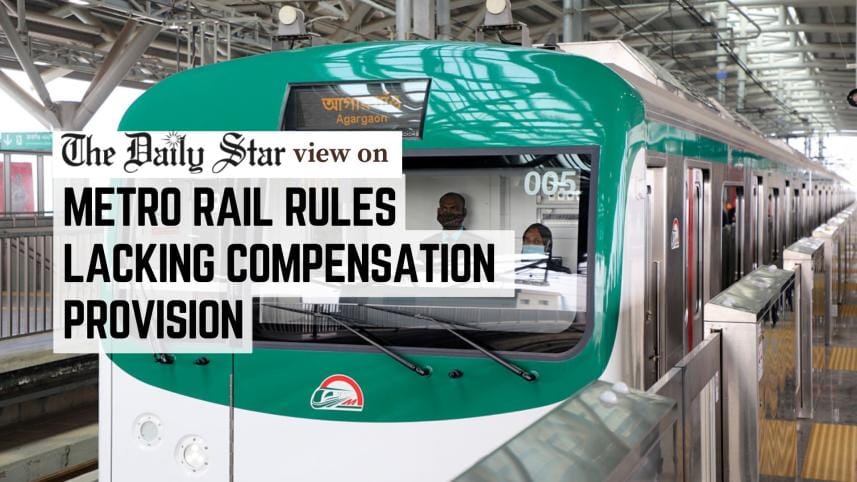The absence of clear compensation rules unacceptable

The death of a pedestrian and injuries to two others in Dhaka's Farmgate area on Sunday from the collapse of bearing pad from a metro rail pillar, have exposed more than a safety failure. They have revealed a deeper flaw in our legal framework: the absence of an enforceable system for compensating victims of metro rail-related accidents. Under the Metro Rail Act, 2015, the Dhaka Mass Transit Company Limited (DMTCL) is legally bound to compensate anyone injured or killed during its operations. The act also mandates insurance coverage for passengers and third parties, including pedestrians. However, the corresponding Metro Rail Rules, 2016, fail to specify how such compensation should be determined or who must pay it, leaving victims and their families without any legal avenue for redress.
At present, compensation is only granted if the government chooses to do so or if it is ordered by a court. When the road transport and bridges adviser announced Tk 5 lakh in compensation and a job for one family member of the victim Abul Kalam Azad, he admitted that due to the absence of relevant provisions in the metro rail regulations, he announced the compensation in accordance with the Road Transport Act, 2018. This should not have been the case. Moreover, when DMTCL officials admit that they have not implemented the mandatory insurance provisions due to "enormous financial cost," they are, in essence, saying that financial convenience outweighs legal and moral responsibility. But should public safety and accountability be conditional on financial convenience?
When it comes to compensating victims of preventable deaths, such as road crashes, fires, or falls into open drains, we see a serious systemic failure across sectors. While the Road Transport Act, 2018, at least specifies compensation amounts, the process is lengthy and complex, and often denies the sufferers timely redress. For metro rail victims, the situation is even worse. The Metro Rail Rules, 2016, contain no provision for compensating accident victims. This legal void exposes the state's negligence and lack of accountability. The government must therefore urgently amend the Metro Rail Act, 2015 and its rules to define clear procedures and responsibilities for compensating the victims, implement the mandatory insurance under Section 28, and ensure DMTCL provides prompt medical support and compensation, as required by law. Pending amendments must also be finalised and enforced, replacing ad hoc payments with a transparent, rights-based mechanism for all victims.



 For all latest news, follow The Daily Star's Google News channel.
For all latest news, follow The Daily Star's Google News channel.
Comments